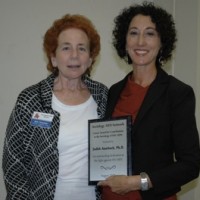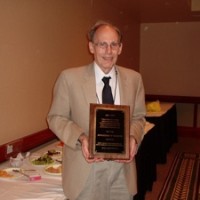
2011 SAN Career Award Winner: Prof. Judith Cook
We are honored to recognize Dr. Judith Cook as the winner of the 2011 Award for Career Contributions to the Sociology of HIV/AIDS. Dr. Cook is currently a Professor in the Department of Psychiatry and Director of the Center on Mental Health Services and Research and Policy at the University of Illinois at Chicago. She received her MA and PhD in Sociology from the Ohio State University in the late 70s. Since then she has become an internationally recognized authority on mental health services research and in this context has made significant contributions to advancing our understanding of the social aspects of the HIV/AIDS pandemic.
Over her distinguished research career, Dr. Cook has directed funded research totaling over $51 million dollars, much of it focused on the social aspects of HIV/AIDS including: emotion management in the process of HIV disclosure; comprehensive public health services for inner- city based HIV care; custody status and outcomes of children orphaned by AIDS; practice change among HIV health care professionals; predictors of access to combination antiretroviral therapy; and social factors impacting HIV disease progression, morbidity, and mortality. Below is a sampling of these important contributions.
Dr. Cook was part of an early cohort of sociologists working in the area of HIV/AIDS. Examples include her 1989 funding from the Robert Wood Johnson Foundation to design and study the Women and Children with AIDS Program at Cook County Hospital in Chicago. In 1991, she contributed to the ASA Curriculum Series “The Sociology of AIDS: Six Lectures and Materials for Instructors and Students” distributed by the ASA Teaching Resources Center. Over the next two decades, she has been part of a team of investigators on the Women’s Interagency HIV Study (WIHS), a longitudinal, multi-site cohort study of HIV-positive women that began in 1994. She was the first chair of the WIHS Social and Behavioral Science Workgroup, leading the study’s efforts to examine factors affecting health and quality of life of HIV+ women. Her earliest work with this cohort documented women’s slow uptake of the latest combination antiretroviral therapies, and showed that social factors such as education, racial/ethnic minority status, and health insurance coverage influenced women’s use of effective treatment. Next, her research focused on how depression and other behavioral health co-morbidities (i.e., use of illicit drugs and alcohol) affect access to and use of lifesaving antiretroviral therapies. Her studies of mental health in the WIHS cohort documented a direct connection between chronic depression and the progression of HIV to AIDS, as well as to the mortality of those already diagnosed with AIDS. Dr. Cook’s findings have informed and significantly altered clinical practices and drug regimen adherence programs nationwide, by calling attention to the need to identify and treat depression in HIV-positive populations.
In the mid-to-late 1990s, Dr. Cook was part of a multi-disciplinary team of investigators studying how to change clinical practice among HIV medical care providers by enhancing their knowledge and competencies for dealing with mental health and neuropsychiatric aspects of HIV/AIDS. Over 600 doctors, nurses, and other health care providers received training through this program and Dr. Cook’s published research showed that training recipients significantly increased the quantity and range of HIV services they provided, the number of HIV-positive patients they served, and improved the quality of HIV care received by the thousands of patients served by these providers.
Dr. Cook’s research has affected services and policies in the area of HIV/AIDS and crack cocaine use. Her recent work showing a link between chronic crack cocaine use and HIV disease progression led the National Institute on Drug Abuse to convene a two-day meeting to explore linkages between drug abuse and mother to child transmission of HIV. Currently, Dr. Cook is the PI on a NIH R01 study to determine the prevalence of mental and substance use disorders in the WIHS cohort, and how these co-morbidities affect HIV/AIDS disease progression. This line of scholarship epitomizes her ability to integrate “bench” science with social science.
Dr. Cook has mentored a large number of students and scholars who are now noted in their own right for innovative and groundbreaking HIV/AIDS research and advocacy. By encouraging the application of sociological theory and methods to HIV/AIDS topics in psychology, rehabilitation, social work, public health, nursing, and women’s studies, she has broadened the reach and influence of Sociology and helped to elevate its prominence. She has worked tirelessly to cultivate the next generation of scholars by encouraging them to study the critical needs of disenfranchised individuals and the ways in which the stigma of HIV/AIDS contributes to the HIV/AIDS pandemic. Dr. Cook’s commitment to participatory action research underscores her enthusiasm for connecting knowledge generation with social change, as exemplified by her 2003 William Foote Whyte Distinguished Career Award from ASA. Her research subjects, most of whom are low-income, predominantly racial/ethnic minority group members, find that being in one of her studies often represents their first experience with being asked for their point of view with genuine interest in their needs and struggles. Unquestionably, this approach encompasses a central goal of sociology — the use of knowledge and lived experience to empower others in the pursuit of social welfare.
Dr. Cook’s long and distinguished career embodies the spirit of the SAN mission. She has advanced our understanding of not only the social aspects of HIV/AIDS, but also the ways that social factors affect physical and mental health with implications for more effective treatment for co-occurring illnesses. Whether it is the evaluation of access to life-saving medications or how social structural inequality affects doctor-patient interactions, her work brings sociological understanding into clinical practice. She has been unswerving in her energy to mentor and train new generations of HIV/AIDS researchers; to connect with local, national and international organizations; to enlarge the frame of governmental attention to include sociological concerns; and, especially, to the critical need for knowledge that is transformative. Dr. Judith Cook’s depth and breadth of contributions makes her a model par excellence of what a sociologist can do for the betterment of the lives of people with HIV/AIDS.
 30. Dec, 2011
30. Dec, 2011 

